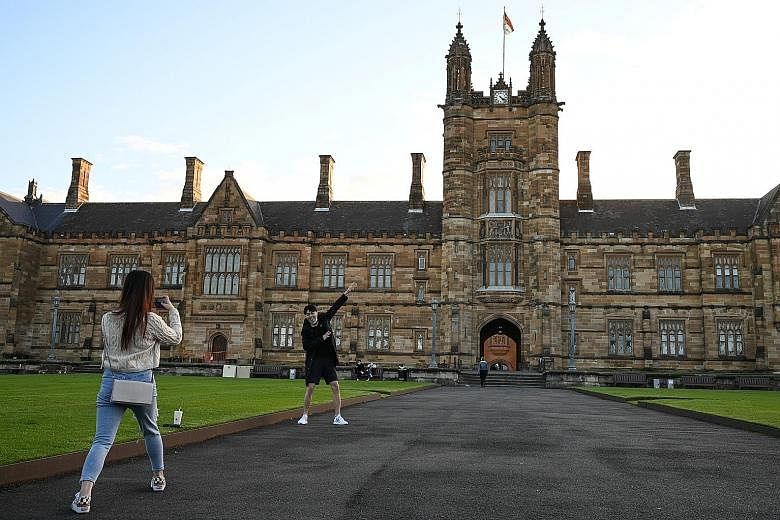Singaporean students enrolled in overseas universities are adopting a wait-and-see approach in deciding if they should return to their host countries, despite the Government's assurances that they will be covered with medical subsidies and insurance should they catch Covid-19.
While Education Minister Lawrence Wong said last month that the authorities will now allow students to travel overseas as academic terms will soon resume, many say their decision hinges on the situation in their host countries.
Those studying overseas at institutions where distance learning is not offered as an option will be eligible for government subsidies and insurance coverage if they test positive for the coronavirus and seek treatment in Singapore.
But some, like Ms Carmen Chin, a first-year student at the University of Melbourne in Australia, said the announcement would not impact her decision to return.
"Our student visa requires us to get health insurance. So if I were in Australia and I got Covid-19, I would choose to get treated there," said the 20-year-old, who is in a bachelor of arts programme.
"It would be easier to contain the virus if I get tested, quarantined and treated there. I would not want to 'import' the virus back home."
Ms Chin said her first semester, which began last month and ends in December, is being conducted fully online, though things could change in the next semester.
The decision whether to travel to Melbourne or not is also out of her hands as the city - the capital of Victoria state that has been the hardest-hit state in the pandemic - is still under strict lockdown restrictions, including border closures.
Said Ms Chin: "If Melbourne allows us in, I would want to go over. It is definitely challenging to not be able to attend school physically. The first semester of the first year is especially important for us to assimilate into the school and its culture, and it is difficult to do that from home in Singapore."
Some who chose to return abroad also said the Government's announcement had little bearing on their decision.
Ms Teresa Yong, 22, a third-year student at the University of Manchester who is reading social anthropology, returned to Manchester on Aug 30. She had booked her flight in late July.
She said she is concerned about catching Covid-19 in the United Kingdom, but chose to return there as "I thought of the situation as something that we cannot keep running away from".
"If I were to test positive for Covid-19 in the middle of the term, I think it would make more sense to seek treatment (in the UK). I would be putting more people at risk travelling back to Singapore," she added.
There is an option for students in her faculty to do full remote learning for the semester, but online learning is very different from face-to-face classes, she said.
"It's harder to engage with the study materials and topics, especially for subject areas like mine where interactions and discussions in lectures and tutorials add a lot of value to our learning."
She also cited difficulties in online learning as one of the reasons she chose to return to the UK. "Due to the time difference, I would have to attend lessons at odd hours if I were in Singapore."
Mr Nidesh Muralidharan, who is reading law at the University of Bristol in the UK, is flying back to Bristol on Sunday. He will have to serve a 14-day isolation period before his final year of studies begins on Oct 5.
"The self-isolation will be at our own costs. If we don't have our own accommodation, we'll be put up at a government facility at our own expense," said the 24-year-old, who will be staying in a private apartment and serving his quarantine there.
He will get his meals delivered, he said, and order groceries online or have a friend help to pick them up.
"This is my last year. The university has told us to come back if we are able to... All of our lectures will be online but our tutorials will be face-to-face, so I'd prefer to be there for my tutorials, at the very least, during a crucial year," said Mr Nidesh.
But he feels reassured somewhat by the Government's announcement, as "it's definitely important to know that there's always the option to come back home in case things go wrong".
There are about 19,000 Singapore students enrolled in universities in the United States, Britain and Australia.
On the home front, a large number of foreign students also appear to be waiting for the Covid-19 situation to blow over.
The Ministry of Education (MOE) said about 10,000 international students have left Singapore since March, and since then, MOE and the schools have facilitated the return to Singapore for about half of them.
The majority of the 5,000-plus students who have yet to return are studying at institutes of higher learning, such as universities.
An MOE spokesman said students who have not returned to Singapore are receiving support from their teachers and lecturers through home-based learning and instructional materials via e-platforms.












